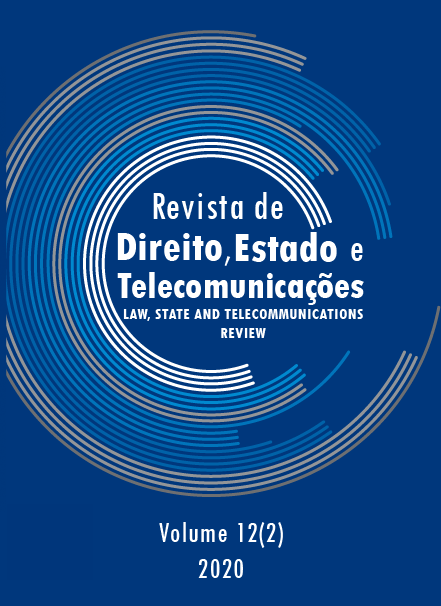Unequal Inclusion
An Analysis of the Trajectory of Inequalities in Access, Use and Appropriation of the Internet in Brazil
DOI:
https://doi.org/10.26512/lstr.v12i2.34718Keywords:
Digital Divide. Inequality. ICT Use in Brazil.Abstract
Purpose ”“ The paper aims at assessing the evolution of the digital divide in Brazil in the last decade from a multidimensional perspective, going beyond the issue of access. How have the inequalities in the use of Internet in Brazil varied through time?
Methodology ”“ The paper investigates the relationship between individual socioeconomic characteristics and household characteristics, and the pattern of Internet access and use in Brazil using multivariate analysis, drawing on data from national ICT surveys between the years 2000 and 2019.
Findings ”“ The results show that increasing access do not necessarily result in a more equitable adoption and use of available online resources. They highlight a persistent “digital elite” capable of a more sophisticated use of the Internet. The maintenance ”” and even the increase ”” of differences in the use of Internet is in line with part of the literature on digital inclusion.
Practical Implications ”“ The study underscores the importance of developing methodological frameworks to better measure the digital divide, allowing it to be used as the independent variable in broader analyses of income inequality and access to public services, for instance. Additionally, the persistence of a "second level digital divide" in Brazil points to the need for policies that address the "digital skills gap" enabling the realization of the Internet's potential to ease social disparities.
Originality ”“ Despite the existing literature on the relationship between online inequalities and other kinds of inequalities, there are still few empirical studies, especially with a multidimensional perspective.
References
AABERGE, R., & BRANDOLINI, A. Multidimensional poverty and inequality. In Handbook of income distribution, vol. 2, p. 141-216. Elsevier, 2015.
ATKINSON, A. B. Multidimensional deprivation: contrasting social welfare and counting approaches. The Journal of Economic Inequality, vol. l, n. 1, p. 51-65, 2003.
BARBOSA, A. F., HATADANI, I. M., KUBOTA, L. C. & SENNE, F. Uso de tecnologias da informação e comunicação pelos jovens brasileiros. In SILVA, E. R. A. da & BOTELHO, R. U. (eds.). Dimensões da Experiência Juvenil Brasileira e Novos Desafios à s Políticas Públicas. Brasília: Ipea, 2016.
BARRANTES, R., GALPERIN, H. & MARISCAL, J. The Internet and Poverty: Opening the Black Box. Victoria: DIRSI, 2014.
CELESTE, C., DIMAGGIO, P., HARGITTAI, E. & SHAFER, S. From Unequal Access to Differentiated Use: Literature Review and Agenda for Research on Digital. New York: Russell Sage Foundation, 2004. Retrived from: https://bit.ly/3bZQ4Bf.
CGI.BR. Pesquisa sobre o uso das tecnologias de informação e comunicação - TIC Domicílios 2019. São Paulo: Comitê Gestor da Internet no Brasil, 2020.
DECANCQ, K., FLEURBAEY, M., & SCHOKKAERT, E. Inequality, income, and well-being. In Handbook of income distribution, vol. 2, p. 67-140. Elsevier, 2015.
DIMAGGIO, P., & HARGITTAI, E. From the ‘Digital Divide’ to ‘Digital Inequality’: Studying Internet Use As Penetration Increases. Working Paper #15, Summer 2001. Princeton University: Center for Arts and Cultural Policy Studies, 2001. Retrived from: https://bit.ly/2RsKm1j.
GALPERIN, H. Sociedad Digital: Brechas y Retos para la Inclusión Digital en América Latina y el Caribe. Organización de las Naciones Unidas para la Educación, la Ciencia y la Cultura. Montevideo: Cetic.br/NIC.br, 2017. Retrived from: https://bit.ly/3hrPihy.
HARGITTAI, E.& HSIEH, Y. P. Digital Inequality. In DUTTON, W. H. (ed.) The Oxford Handbook of Internet Studies. Oxford, UK: Oxford University Press, p. 129”“150, 2013.
HELSPER, E. J. (2014). Digital Inclusion in Europe: Evaluating Policy and Practice. London School of Economics Media Policy Blog, 2014. Retrived from: https://bit.ly/32vF5w7.
HELSPER, E. J. & VAN DEURSEN, A. The Third-Level Digital Divide: Who Benefits Most from Being Online? In ROBINSON, L; COTTEN, SR & SCHULZ, J. (eds.). Communication and Information Technologies Annual. Studies in Media and Communications, vol. 9, Emerald, p. 29-52, 2015.
______. Collateral Benefits of Internet use: Explaining the Diverse Outcomes of Engaging with the Internet. New Media & Society, vol. 20, n. 7, p. 2333-235, 2017.
INSTITUTO BRASILEIRO DE GEOGRAFIA E ESTATÃSTICA. Acesso à Internet e Posse de Telefone Móvel Celular para Uso Pessoal ”“ 2005. Pesquisa Nacional por Amostra de Domicílios. Rio de Janeiro: IBGE, 2007. Retrived from: https://bit.ly/2Rr1pRt.
INTERNATIONAL TELECOMMUNICATION UNION. Manual for Measuring ICT Access and Use by Households and Individuals ”“ 2014 Edition. Handbooks on Telecommunications Development. Geneva, 2014. Retrieved from https://bit.ly/3klnWM0.
MARQUES, E. Redes Sociais no Brasil: Sociabilidade, Organizações Civis e Políticas Públicas. São Paulo: Centro de Estudos da Metrópole, 2012.
SELWYN, N. Reconsidering Political and Popular Understandings of the Digital Divide. New Media & Society, vol. 6, n. 3, p. 341-362, 2004.
UNITED NATION. UN E-Government Survey 2018. Department of Economic and Social Affairs: New York, 2018. Retrieved from: https://bit.ly/3iztGRN.
VAN DEURSEN, A., & VAN DIJK, J. The Digital Divide Shifts to Differences in Usage. New Media and Society, vol. 16, n. 3, p. 507-526, 2014.
VAN DIJK, J. The Deepening Divide: Inequality in the Information Society. London: Sage, 2005.
______. The Evolution of the Digital Divide: The Digital Divide Turns to Inequality of Skills and Usage. In BUS, J; CROMPTON, M; HILDEBRANDT, M & METAKIDES, G (eds). Digital Enlightenment Yearbook 2012. Amsterdam: IOS Press, p. 57-78, 2012.
WESSELS, B. The Reproduction and Reconfiguration of Inequality: Differentiation and Class, Status and Power in the Dynamics of Digital Divides. In RAGNEDDA, M. AND MUSCHERT, G. W. (eds.) The Digital Divide: the Internet and Social Inequality in International Perspective. Series: Routledge Advances in Sociology. Routledge (Taylor & Francis Group): London, pp. 17-28, 2013.
WORLD BANK. World Development Report 2016: Digital Dividends. World Bank Publications, 2016. Retrived from: https://bit.ly/2ZDu3mX.
WORLD WIDE WEB FOUNDATION. The Webindex Report 2014-15. Retrieved from https://bit.ly/2ZCUwAS.
Downloads
Published
Issue
Section
License
Copyright (c) 2020 Law, State and Telecommunications Review

This work is licensed under a Creative Commons Attribution 4.0 International License.
By submitting this paper to the Law, State and Telecommunications Review,
I hereby declare that I agree to the terms of the Creative Commons Attribution 4.0 International (CC BY 4.0).


